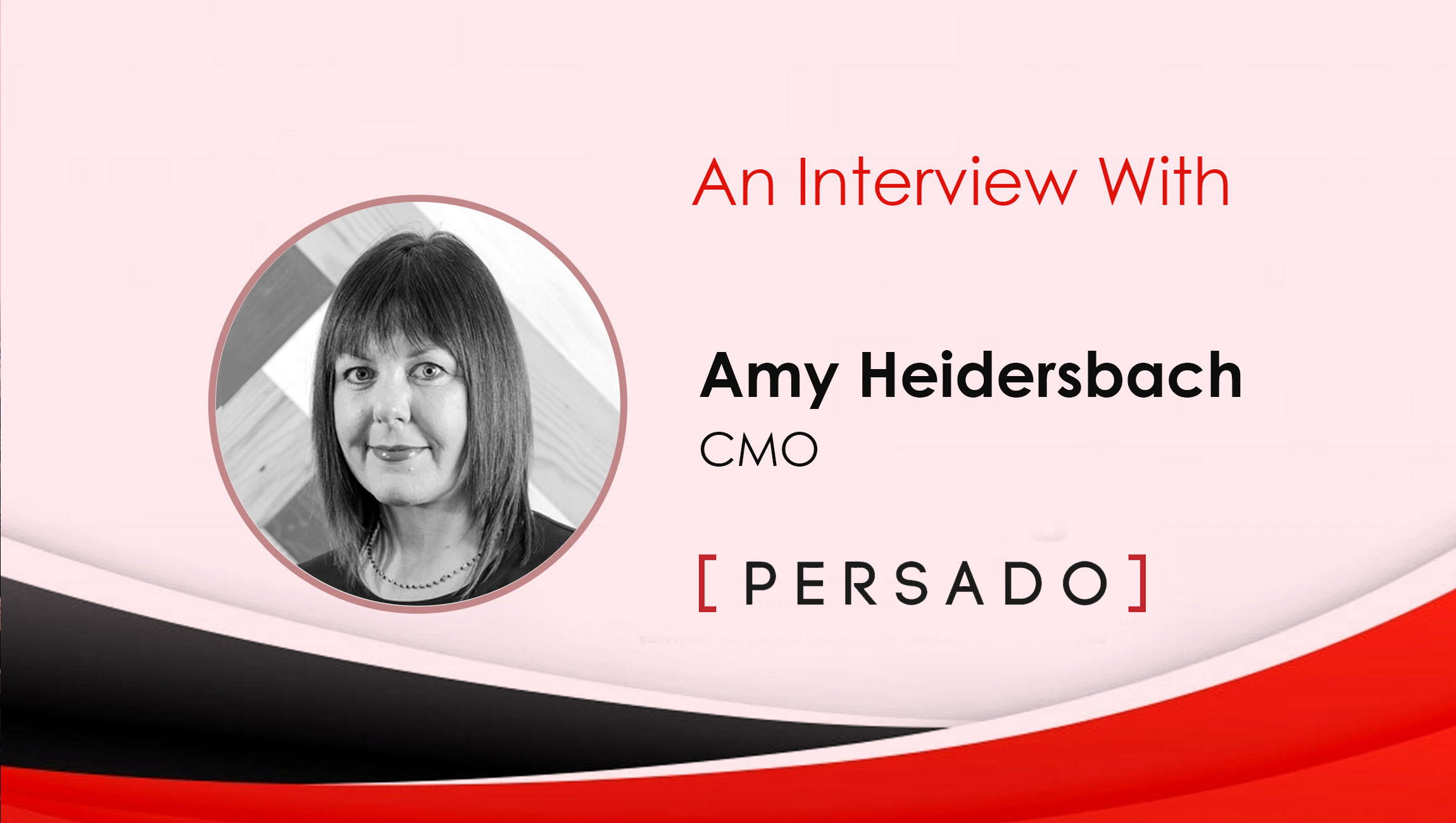Amy Heidersbach, CMO at Persado chats about a few key martech and marketing trends that will be the focus in 2022 for B2B teams:
______
Welcome to this MarTech Series chat Amy, tell us more about your marketing journey through the years and what inspired you into this field?
My father was an advertising executive, so marketing has always been a part of my life. I studied advertising at the University of Kansas and got my start in brand management in the financial services realm. Since then, I’ve led marketing for top brands such as Visa, PayPal, and Capital One – and more recently, at CareerBuilder and Alteryx.
As far as how I got started in marketing, I was insatiably curious as a child and always asking my parents a ton of questions about everything going on around me. This blossomed further as I grew up, went to college, and started my career. Great marketers not only possess an innate sense of curiosity, they stay curious every day of every week about why people do what they do, and for many years this was left up to our best guesswork and conjecture. In the last two decades or so, what’s really inspired me and kept me in the marketing field is the access to data and technology we now have to better inform our creative minds and the decisions we make. Marketers have become proficient buyers and users of technologies that enable us to move faster, better equip us to unearth the answers embedded within our curious selves, and allow us to work more whole-brained.
Marketing Technology News: Boost.ai Recognized in the First Ever 2022 Gartner® Magic Quadrant™ for Enterprise Conversational AI Platforms
Over the years, how have you seen B2B marketing evolve and what do you feel B2B marketing will look like in 2022 and beyond?
I’ve noticed a few evolving trends in the industry that are rapidly changing the marketing landscape. Some of these include:
Changing privacy laws that will necessitate marketing innovation and creative thinking: New privacy laws are putting brands into uncharted territory that requires quick innovation to ensure results. Investing in data infrastructures to leverage and activate first-party data is how brands can deliver personalized content amidst these new privacy regulations.
Businesses are adapting to consumers’ increasing digital savviness to better understand them and serve their needs: Even non-digital natives are now taking advantage of the massive uptick in digital market activities such as curbside pickup, which was previously unheard of. With customers increasingly on digital capabilities for transactions, it’s critical for marketers to use this increasingly entrenched digital savviness as a central guidepost for their upcoming product rollouts.
AI-generated content will be the revolution needed to tackle digital marketing complexities: Today, companies are bringing their physical storefront experience to the digital realm. AI-generated content, which is heralded as the one of the most innovative areas of AI today, is the key to scaling to this level of complexity while still maintaining the unique aspects of your brand’s voice that customers love and want to keep coming back to.
Customer Data Platforms are becoming more popular: I think 2022 is the year we will see Customer Data Platforms come into play more and more as highly personalized and customer-centric experiences become top of mind for marketers. With more brands looking to generate results via their first-party data, I predict that CDPs will become more common throughout martech stacks. To really maximize the value of a CDP, marketers should employ AI-generated content for the best chance at maximizing meaningful customer engagement
As a CMO, what do you feel needs fixing in the typical B2B marketing process of today? A few challenges you see teams still struggle with?
I like to work as cross-functionally with my teams as possible, and like to think of today’s B2B marketing process through the lens of three key areas:
- Be quantum: Marketers don’t always visibly ‘see’ the various customers, analysts, communities, etc. that they are looking to connect with. The digital transformation requires marketers to educate themselves on when, where, and how their customers are connecting to ensure that their timing, creative, and demand generation is perfectly tailored.
- Be bionic: Today’s buyers and sellers are interacting faster and faster, and while what we think of as a more traditional sales funnel is certainly still relevant in some cases, today’s marketers also need to be conversation ready at any point in the customer journey. Brands should be ready to flex their digital muscle at the first signal that a potential buyer is ready to speak with them.
- Be human: I’ve had the great fortune to have worked at many different organizations and speak at many conferences over the years, and something I like to remind people is that at the end of the day, we cannot forget that we’re marketing to people who ultimately make the buying decision – and these people have a lot of trust in what technology is able to offer them in terms of security, career growth, and the development of their teams. It’s important to speak to them in plain language and acknowledge that all the data in the world doesn’t negate the emotional component of a decision making process.
As marketers look for newer ways to meet market needs and optimize use of their MarTech to get more precise in their targeting and messaging approach, what should they be keeping in mind?
I tend to think of creative as the ‘last mile’ in developing positive, memorable customer experiences, so it’s important for marketing teams to be empowered with the right technology to generate creative that will drive business results. There are a few key areas I think marketers should focus on this year to keep up with this rapidly changing industry:
Invest in personalization: Content was once the least digitized part of companies’ marketing stacks, but today’s winning MarTech strategies require marketers to understand their customers’ exact language and emotional sentiments throughout their buying journeys. Investing in artificial intelligence capabilities over the long term will also enable marketers to implement highly targeted, personalized content strategies at scale while providing actionable insights for future campaigns and initiatives.
Perfect the digital storefront experience: The right MarTech strategy brings the intimate, personal experience of visiting the shop around the corner to the digital world, ensuring customers have a seamless experience across each touchpoint. The digital storefront also won’t go away once the pandemic is over. If anything, COVID has shown us the clear, long-term appetite customers have for digital shopping experiences. A successful digital storefront will put the customer at the center of the experience and provide them with helpful and relevant content that is uniquely tailored to their needs.
Content automation: As customer privacy laws and expectations continue to evolve and shape customers’ experiences with brands, precise content generated with the help of AI and machine learning will become even more crucial. Content automation not only cuts down costs in the short term but also builds loyal, long-lasting customer relationships in the long term.
Leverage AI to power marketing creative: AI can now deliver customer insights for creative the same way we’ve come to expect from segmentation, promotions, or pricing. AI doesn’t eliminate the need for talented marketing creative professionals, but rather maximizes the impact that content can have on customers.
Marketing Technology News: MarTech Interview with Nikhil Behl, CMO at FICO
A few thoughts on why AI-powered platforms can help them drive ROI when it comes to personalization and achieving marketing at scale easily?
AI-powered platforms are changing the way brands interact with customers. It’s not only about adding AI capabilities to your tech stack, but also about treating the technology like another member of your team — one that can augment human capabilities and be held accountable for results. The power of AI makes a tremendous difference in content and creative, which is traditionally, one of the biggest blind spots in marketing. AI is able to translate words and language into digestible metrics that can guide your next iteration of content, enabling marketers to deliver true personalization and custom experiences at scale. For consumers, the type of intimate communication they’d receive from a brick and mortar experience can now be carried over into their digital lives through AI-informed content.
More and more, brands are experiencing the tremendous impact of AI-powered platforms on generating better customer experiences, more usable human insights, and stronger decision making—all of which add up to delivering massive bankable ROI, sometimes up to 18x.
Some tips on what it takes to drive real customer value and trust in today’s crowded marketplace?
I think today’s customers place huge value on authenticity and want to feel as though their favorite brands can converse with them in a realistic, meaningful way. This can take the form of: moving toward a more purpose-based brand alignment, maintaining honesty, consistency, transparency to maintain trust with your customers, and leveraging AI to implement the right words at the right times across communication channels.
Today’s customers also have endless options when choosing which brands to buy from. Brands must demonstrate a deep knowledge and understanding of consumer needs throughout the lifecycle of the buying journey in order to stand out and increase retention over time.
Some last thoughts, takeaways, digital marketing / MarTech tips and best practices before we wrap up!
As much as we all talk about, and rely on, technology – the real competitive differentiator for a brand are talented people. It’s always been a best practice of mine to continuously invest time and energy in getting to know the individuals on my teams. Your team’s individual goals and motivations are the pieces of fabric that eventually come together in a gorgeous quilt or tapestry, and your team is really at the center of everything you do. I am always thinking of new ways to serve my team and show up for them, especially with how difficult these last two years have been.
Marketing Technology News: 3 Enterprise Automation Trends Marketers Should Look Out For in 2022

Persado is the AI content generation and decisioning platform that unlocks billions in incremental revenue for data-driven enterprises. The Persado platform uses sophisticated AI, data science, natural language understanding, and machine learning to generate personalized messages by leveraging the world’s most advanced language knowledge base mapped to human emotion. Companies can gain full visibility into the trends and language that will win at every moment in the customer journey with quantifiable results and data-driven insights, while ensuring the messages stay on brand.
Amy Heidersbach is Chief Marketing Officer for Persado, where she oversees global marketing efforts. She’s made a career out of leading transformational B2B and B2C marketing and brand initiatives at companies such as Visa, Capital One, PayPal, Alteryx, and CareerBuilder. With a commitment to “full stack, integrated marketing,” Amy has a 20+ year track record of success building authentic brands, launching innovative products, creating categories, and scaling businesses in a variety of industries.
Missed The Latest Episode of The SalesStar Podcast? Have a quick listen here!
Episode 111: Driving Better Productivity within your Product Team: with Kristina Simkins, VP of Product at Lessonly by Seismic
Episode 110: Driving Sales-Marketing Unity with Chetan Chaudhary, Chief Revenue Officer at Scale AI
Episode 109: B2B Revenue Generation Tactics with Michelle Pietsch, VP of Revenue at Dooly.ai











